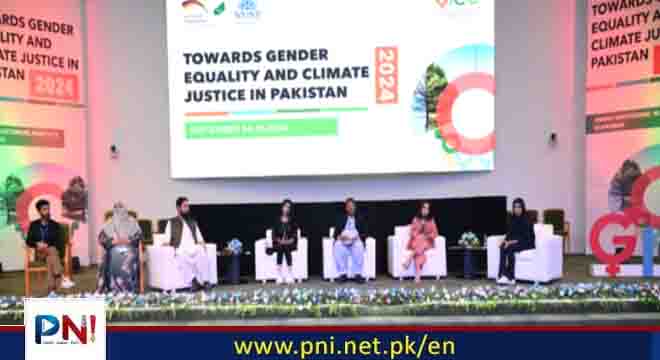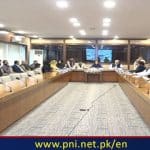ISLAMABAD, Sep 30 :Speakers at the conference “Gender, Intersectionality and Climate Change: From Scientific Evidence to Action” held here Monday highlighted the critical need for equitable climate policies that address the unique challenges facing women and marginalised communities.
An overwhelming number of academics, policymakers, development workers and activists converged on the National University of Sciences and Technology (NUST) to attend the conference, funded by the German Federal Ministry for Economic Cooperation and Development (BMZ) and supported by the Deutsche Gesellschaft für Internationale Zusammenarbeit (GIZ) GmbH.
The conference on Gender, Intersectionality and Climate Change (GICC) featured panel discussions, case studies, and an interactive exhibition showcasing innovative approaches to gender-responsive climate governance.
The event kickstarted with a powerful opening statement by First Secretary of German Embassy, Mr Jan Kühn von Burgsdorff who stressed the importance of gender inclusion in climate policies and Germany’s support for Pakistan’s efforts to achieve the desired objectives.
Pro-Rector Academics NUST, Dr Osman Hasan in his closing remarks, emphasised the need for empowering women and ensuring their equal participation in climate decision-making, which could lead to more effective and equitable solutions in addressing the challenges posed by climate change.
Leading experts at the conference highlighted the disproportionate impact of climate change on women and marginalised communities.
Director and Founder of the Karachi Urban Lab at the Institute of Business Administration (IBA), Karachi, Dr Nausheen Hafeeza Anwar underscored the need for inclusive decision-making in climate governance. Dr Sauleha Kamal from the University of York and Dr Muhammad Sajjad, from the University of Hong Kong, provided important insights into the gendered aspects of climate adaptation and the vulnerability of disaster-prone areas.
Complementing the insightful discussions, the conference featured an Art and Photo Exhibition, showcasing visual representations of how climate change impacts different communities, particularly women.
A Project and Product Exhibition, modeled after the concept of a “human library,” allowed attendees to engage with ongoing projects that promoted gender equity in climate action. The interactive platform fostered meaningful dialogue between experts and participants, further enriching the conference experience.
The conference underscored NUST’s commitment to gender mainstreaming and providing real solutions for real problems.
By integrating gender perspectives into climate action, NUST is leading the way in addressing the complex, interconnected challenges of climate change, social justice, and sustainable development, ensuring that the voices of marginalised communities are heard and acted upon.
The university is committed to continue its efforts to create meaningful, impactful change both at the national and global level.
Follow the PNI Facebook page for the latest news and updates.







